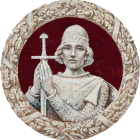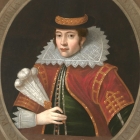Holidays and Celebrations - 1907 Romanov Christmas in Tsarskoe Selo
An Imperial 1907 Romanov Christmas in Tsarskoe Selo
General Alexander Spiridovitch was the Chief of Secret Personal Police in charge of protecting Nicholas II and his immediate family at all times outside of the Imperial Palaces. He served from 1905 until the outbreak of the First World War in late 1914.
His two volume work "Les Dernieres Annees de la Cour de Tzarskoe Selo", (Payot, Paris, 1929) is an invaluable day to day account of the Imperial Family, and important events around them during those years.
Published originally only in Russian and French, it has been a neglected source until recently. The following account of the 1907 Imperial Christmas Celebrations in Tsarskoe Selo is my own translation from the French undertaken in 2004.
Rob Moshein
It was in the midst of these occupations and preoccupations that we became surprised by the Christmas holidays. These holidays, at least for Their Majesty's, were far from days of rest. In addition to his usual obligations, the Emperor had to attend six Christmas trees, in Tsarskoe Selo alone.
Christmas trees at the Military Hospital, the Nursing School, the Home for Disabled Soldiers; Christmas trees organized for the officers of the security service of all ranks, for the officers and the men. And if these first four would only require his presence for an hour or two, the last would require him to be present for three hours minimum. The last was also celebrated twice on two consecutive days in the Horse Ring at the Court.
Our detachment was invited for the first day of the Christmas tree, after the Emperor bestowed a special uniform on us.
Two o'clock in the afternoon. In the middle of the Horse Ring, which abutted the corridor of the Imperial access, they had put up a platform on which they erected a gigantic Christmas tree, which was as tall as the height of the room and was lit with thousands of electric lights. Its branches were hung with bows, candies, spice breads, candies nuts.
To the right of the tree several rows of tables were arranged on which were piles of Christmas gifts: alarm clocks, silver spoons, cups, sugar bowls, all kinds of interesting things for domestic use, packages of spice breads, hazelnuts and caramels.
To the left of the tree they had put down a rug and placed chairs on it, an improvised salon for the Imperial Family.
To the left of the platform was the balalaika orchestra of the Personal Regiment with the renowned Andreyev who was known for his playing throughout the world. He was in the uniform of and wearing the Order of St. Anne. To the right of the platform was the chorus of His Majesty's Escort. In the center of the horse ring on one side were the Personal regiment and the different detachments from the Minister of the Court, the other escort of His Majesty, the Palace police, the sailors from the "Holland", our detachment, the Tsarskoie-Selo police, etc, etc.
At precisely 2 o'clock the Emperor arrived with all of his children and Grand Duchess Olga Alexandrovna. The Empress was indisposed and so in her place the Grand Duchess gave out the Christmas presents.
The command "Smirno!" (attention) resounded. The Tsar slowly made a tour of all of the divisions, gave his hand to some of the superiors, spoke some words to some of the subalterns then returned to the platform and stopped next to the improvised salon.
The balalaika and chorus then began: "Absolute Master of our great land, you who God watches over, our Orthodox Tsar, our sun, - our love for you is infinite."
During that time, the men from the different divisions approached the tables with the Christmas gifts in a long line, and each tore off a number from a roll. The Grand Duchess, the Tsarevitch and the officers unrolled the bits of paper on which there were numbers written, and would get the gifts with the corresponding number and bring them to Olga Alexandrovna, who then gave them to the recipient. He would then kiss the hand of Her Highness, thank her militarily and proceed quickly to the exit, saluting the Emperor as he passed.
Getting the gifts greatly amused the Tsarevitch. He was especially happy when someone won an alarm clock. The officers would make the alarm clock ring to the great joy of the Tsarevitch.
In previous years the distribution of Christmas gifts had been done by the Empress and had been much more solemn. We greatly regretted her absence that year. However, the distribution went on and the Emperor listened to the concert.
The first song ended and the balalaikas played alone. They played with remarkable artistry. The Tsar thanked them and spoke for a while with Andreyev and gave him his hand.
Then came the Cossacks turn. They began with an ancient war song, followed by a gay song, with a fast rhythm, accompanied by the noise of plates, tambourines and loud whistles.
Listening to them, the Tsarevitch lost all interest in alarm clocks. He was all attention, his eyes brilliant, his cheeks were red with emotion. He was charming in his little white uniform and wearing his little white fur hat.
After the songs came the dancing. The Cossack Dzotzoyev danced the lesghinka. Like a large blue bird the Caucasian Cossack floated and almost never touched the ground. His tcherkeska fluttered in the air. His arms made gracious movements.
Little by little the dance grew faster, the movements became more rapid and it degenerated into a veritable hurricane to the noise of the "zourna" the "tulumbache" and the rhythmic clapping of hands.
The other dancers joined in to this violent whirlwind. They threw their daggers, gave out shrill cries and soon the dance became a genuine vertiginous chaos of leaps, gestures, and movements accompanied by the slightly savage music of the Orient.
At five o'clock the party was over. The Emperor took his leave of the officers. The Chief of Administration of the Palace accompanied him to his carriage. The Tsar thanked him for his efforts, and for the good order which prevailed during the party. They helped in to the carriage the children and the Tsarevitch and everyone left.
For the officers, they had organized a special Christmas tree in the Alexander Palace.
In Gatchina, at the home of the Empress Marie Feodrovna, the holiday had a more intimate and familial character. They had decorated a Christmas tree which was attended by the officers of rank, subalterns and officers. I can recall how much emotion I had when for the first time I approached the Empress-Mother to receive my Christmas gift from her hands. Grand Dukes Michael Alexandrovitch and Alexander Michaelovitch were by her side, while Grand Duchesses Xenia and Olga Alexandrovna were occupied with taking the objects off which adorned the tree according to the numbers drawn.
The Empress offered each person their gift with a very kind smile. I accepted my Christmas gift like a precious object, and respectfully kissed the Empress's hand, although my heart beat wildly in my chest.
However the gay lights of the Christmas tree dimmed, the holiday which had then taken place in the presence of Their Majesties began again in our own homes, with our own families.
Each of us were being waited on by our own, impatient to see the gift which the father, husband or son had received from the Imperial Family.
They regarded these objects with ecstasy, the hands of children were drawn toward the candied nuts and sweets which came from the Imperial Christmas tree. Nothing could be, in the eyes of these children, more beautiful or dear, nothing could ever equal them.
However were the children the only ones who felt that way? And ourselves, did we not safe guard those gifts in special places, did we not preserve intact that first candy, wrapped in its paper, which we had received from the hands of the Emperor, did we not even keep that match which the Tsar had, by chance, offered us to light our cigarette?
I knew a little boy who, accompanied by his little sister, would from time to time run into his father's study, asking him to show them "one more time" the famous "candy" which he had received: "You will never eat it? Isn't that so Papa?"
Even quite recently, in Paris, I ran into a Cossack General, aged and gray from the Revolution, who kept in his cigar case one of those dear matches, half burnt, browned and yellowed with age.
"Here, see" he told me, showing it to me while his hand trembled and his eyes brimmed with tears.





 Imperial Bedroom
Imperial Bedroom Portrait Hall
Portrait Hall Mauve Room
Mauve Room Maple Room
Maple Room Aleksey's Bedroom
Aleksey's Bedroom Nicholas's Study
Nicholas's Study Aleksey's Playroom
Aleksey's Playroom Formal Reception
Formal Reception Balcony View
Balcony View Aleksey- Balcony
Aleksey- Balcony Children-Mauve
Children-Mauve Nicholas's Bathroom
Nicholas's Bathroom Alexandra- Mauve
Alexandra- Mauve Nicholas's Reception
Nicholas's Reception Tsarskoe Selo Map
Tsarskoe Selo Map